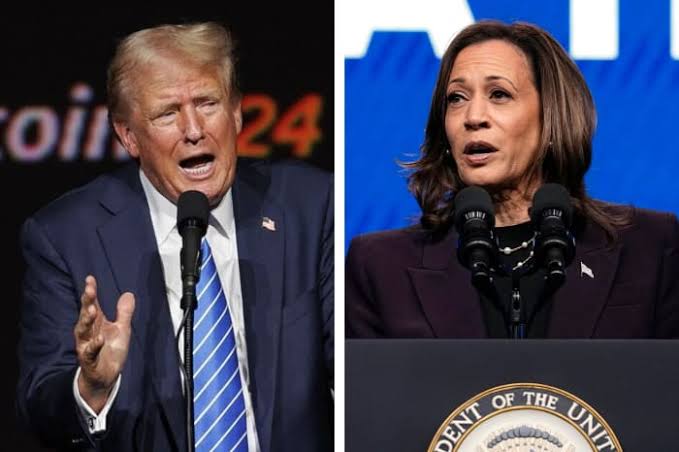
Battle for America’s Future: Harris vs. Trump 2024 Presidential Debate
The 2024 presidential debate between Vice President Kamala Harris and former President Donald Trump marked a crucial moment in the election races. Hosted at the National Constitution Center in Philadelphia, this face-off presented two radically different visions for the future of the United States. The debate covered key issues such as the economy, immigration, foreign policy, and climate change, highlighting the deep ideological divides between the two candidates.
The Economy: Contrasting Approaches
The debate began with a focus on the economy, a critical issue for voters. Vice President Harris emphasised her plan to build an “opportunity economy” aimed at supporting middle-class families and small businesses. She proposed a $6,000 tax credit for young families and a $50,000 tax deduction for small businesses to address housing affordability and foster economic growth. Harris argued that these initiatives would strengthen the backbone of the American economy, contrasting them with Trump’s approach, which she claimed favoured the wealthy through tax cuts for billionaires and corporations.
Donald Trump painted a bleak picture of the current economy, blaming inflation for harming the middle class. He credited his previous administration with creating one of the best economic periods in U.S. history, which he claimed Harris and President Joe Biden had undone. Trump’s plan focused on imposing tariffs on imports, which he said would generate billions of dollars for the U.S. Treasury and reduce reliance on external markets. Harris countered by labelling this a “Trump sales tax”, stating it would increase the cost of living for American families.
Immigration: Diverging Policies
Immigration became another focal point, with Trump adopting a hard-line stance. He accused the Biden-Harris administration of allowing millions of illegal immigrants into the country, including criminals, and vowed to implement a large-scale deportation plan using the National Guard and local police. Trump claimed these immigrants were taking jobs from American citizens and posed a threat to public safety.
Harris rebutted Trump’s inflammatory remarks, highlighting the lack of evidence to support his claims. She advocated for addressing the root causes of migration, particularly from Central America, and called for comprehensive immigration reform. Harris supported stronger border security while providing pathways to citizenship for immigrants contributing to the economy, presenting herself as focused on pragmatic solutions rather than fearmongering.
Abortion: Fundamental Divides
Abortion was another divisive issue. Harris criticised Trump for his role in appointing Supreme Court justices who overturned “Roe v. Wade”, resulting in widespread abortion bans across many states. She described these “Trump abortion bans” as extreme and harmful, pledging to restore federal protections for reproductive rights if elected. Harris framed the issue as one of personal freedom and healthcare access.
Trump defended his administration’s actions, portraying the Supreme Court decision as a victory for states’ rights. He supported exceptions for cases of rape, incest, and the life of the mother, but maintained that allowing states to legislate on the matter was the correct step forward. This topic illustrated the candidates’ polarised views on reproductive rights and the role of federal government intervention.
Foreign Policy: Ukraine and Global Security
On foreign policy, the candidates displayed sharply different approaches. Harris praised the Biden administration’s support for Ukraine, underscoring the importance of defending Ukraine’s sovereignty against Russian aggression. She emphasised her diplomatic efforts with NATO allies and Ukrainian President Volodymyr Zelensky, highlighting the Biden administration’s role in preserving Ukraine’s independence.
Trump, however, claimed the war between Russia and Ukraine would never have started under his leadership. He promised to end the conflict within 24 hours through negotiations with both Zelensky and Russian President Vladimir Putin. Harris warned that Trump’s approach could embolden Russia, further threatening European stability.
Climate Change: Opposing Priorities
Climate change was another issue where the candidates diverged. Harris framed climate change as an existential threat and pointed to the Biden administration’s trillion-dollar investments in clean energy, which she said had created 800,000 manufacturing jobs. She argued that addressing climate change was crucial for future generations, while also boosting the economy through green energy investments.
Trump, however, downplayed climate change, repeating his belief that clean energy policies were harmful to American workers, particularly in the oil and gas industries. He criticised Harris for supporting policies that he argued would increase energy costs and harm traditional energy sectors. Trump’s emphasis on traditional energy sources stood in stark contrast to Harris’s vision of a renewable energy future.
Conclusion: A Nation at a Crossroads
The Harris vs. Trump debate presented two vastly different visions for the future of the United States. Harris positioned herself as a candidate focused on progress, equality, and international cooperation, advocating policies aimed at uplifting the middle class and tackling global challenges such as climate change and international conflict. Trump, in contrast, framed his campaign as a return to traditional values and economic protectionism, with an emphasis on strict immigration policies and strong law enforcement.
As voters head towards the polls, the debate highlighted the stark choice they face: a continuation of the Biden-Harris administration’s policies or a return to Trump’s leadership. The outcome of the election could have significant consequences for the direction of the country, with each candidate offering a radically different path forward.
Aric Jabari is a Fellow and the Editorial Director at the Sixteenth Council



